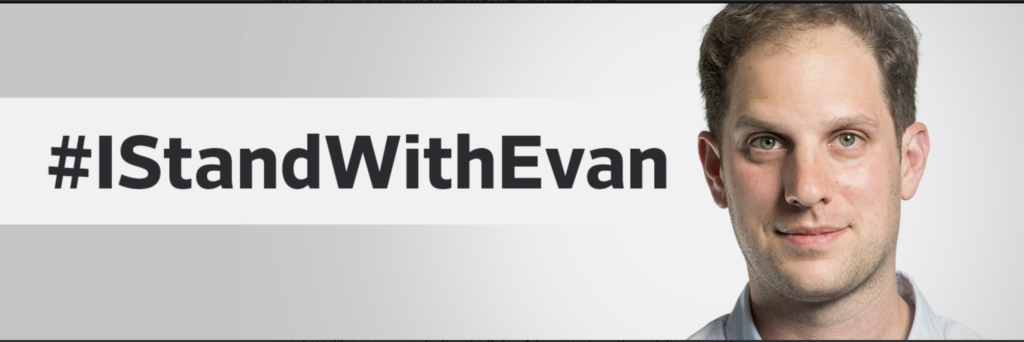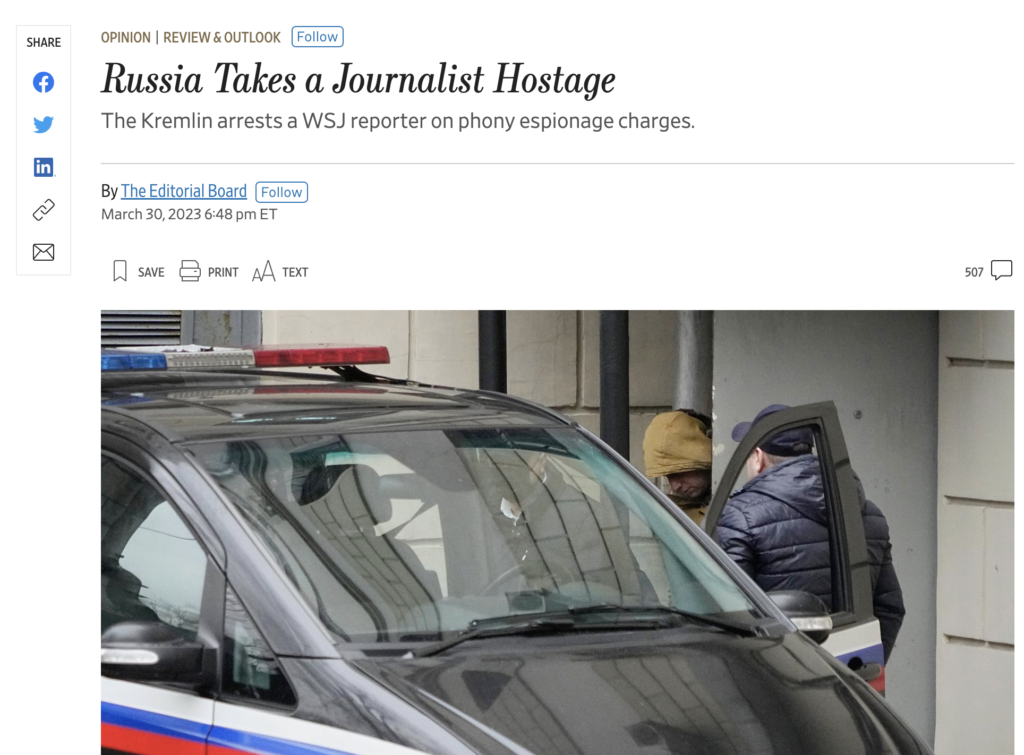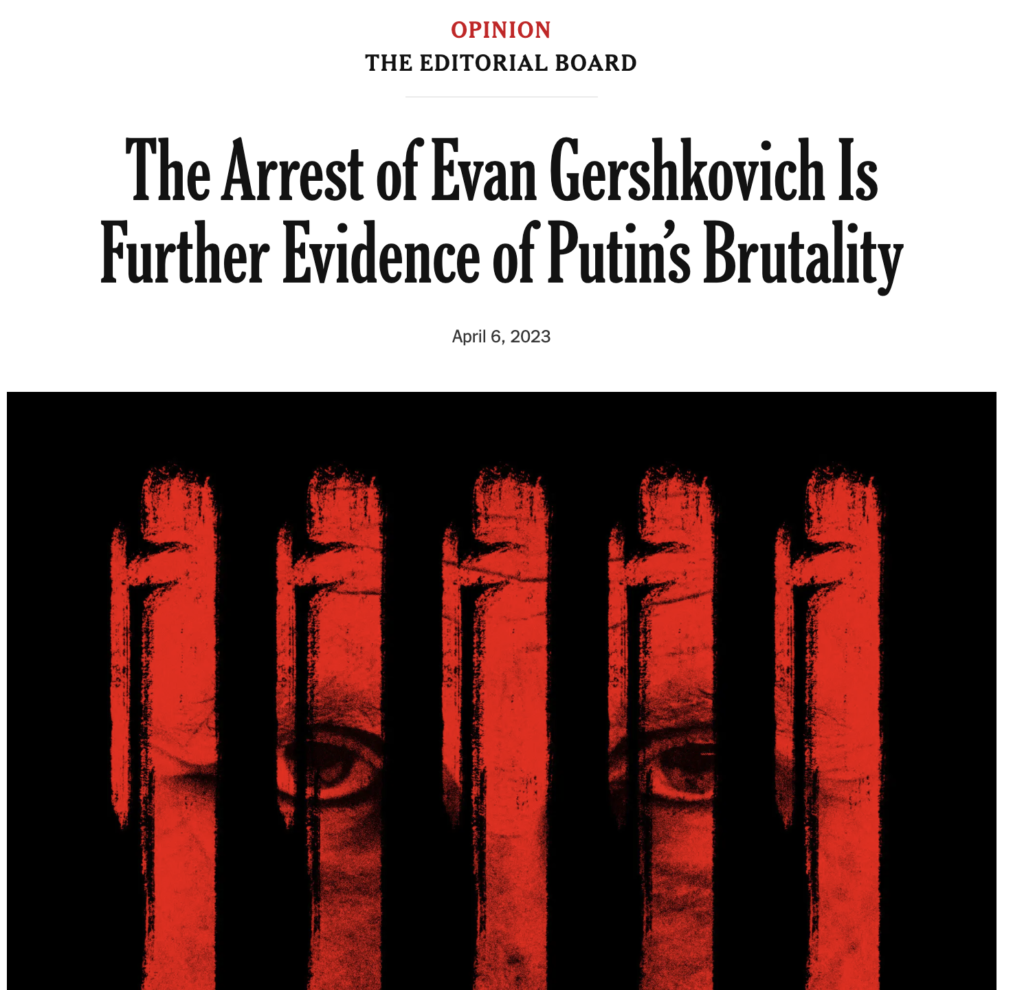Reporter Evan Gershkovich is a pawn in a cruel geopolitical game

The drumbeat of condemnation in the U.S. of Russia’s detention of Wall Street Journal reporter Evan Gershkovich continues. In a rare show of bipartisanship, U.S. Senators Charles Schumer and Mitch McConnell issued a joint statement demanding “the immediate release of this internationally known and respected independent journalist.” This came a week after the Biden Administration, through Secretary of State Antony Blinken, similarly condemned Gershkovich’s arrest, blasting “the Kremlin’s continued attempts to intimidate, repress, and punish journalists and civil society voices.”
And it follows other expressions of support by news organizations such as the Society for Advancing Business Editing and Writing, which warned that, “The arrest of Gerschkovich may signal a broader crackdown on the remaining Western reporters in Russia, which already has made it a crime for its citizens to criticize the unlawful invasion of Ukraine.” The National Press Club awarded its highest honor for press freedom, the John Aubuchon Award, to the journalist well ahead of its normal year-end schedule. A club official said: “we want to do what we can to call out his situation and stand up next to him.”

For its part, The Wall Street Journal has run a continuing series of pieces about such developments. In one piece it described how readers can offer their support for the reporter through social media posts featuring his photo and such phrases as “#IStandWithEvan. “Readers can download this collection of media assets to surface and share across their personal social-media accounts—from Twitter and Facebook to LinkedIn, Instagram and beyond,” the Journal advised. “They can be added as user profile photos, banners or posts.”
Of course, the Journal also editorialized against his detention. “The timing of the arrest looks like a calculated provocation to embarrass the U.S. and intimidate the foreign press still working in Russia,” the paper’s editorial board opined. “The Kremlin has cowed domestic reporting in Russia, so foreign correspondents are the last independent sources of news. Mr. Gershkovich’s arrest comes days after his byline was on a revealing and widely read dispatch documenting the decline of the Russian economy. The Kremlin doesn’t want that truth told.”
The New York Times also weighed in, pairing its condemnation with an attack on Putin and a defense of Ukraine. “The Kremlin’s readiness to seize an accredited journalist as a hostage demonstrates again why the United States and its allies need to stand firm to block Mr. Putin’s designs on Ukraine,” the Times argued. “Ukraine has chosen to be part of a Europe that is stable, peaceful and governed according to rules and law. Mr. Putin would supplant that with fear and force.”

Both papers also suggested that Putin may have grabbed Gershkovich in retaliation for the United States indicting Sergey Vladimirovich Cherkasov, a Russian national suspected of spying against the U.S. Noting that Cherkasov posed as a Brazilian and reportedly entered an American university, the Times added the caveat that “there has been no indication so far that the Russians are looking to swap for him.” The papers also recalled the swap of athlete Brittney Griner for Russian arms dealer Viktor Bout, with the Times noting she was held for about 10 months. In an unhelpful note, the Journal took a swipe at the Biden Administration, expressing its thanks for the administration’s condemnation but adding, “But it’s fair to ask why Mr. Putin believes he can snatch Americans and come out ahead.”
All these protests are necessary, of course. If Gershkovich’s arrest were met with silence, the Kremlin would likely take away the absurd message that this distinguished journalist was spying for the U.S. In fact, what he was doing – in open sight and perhaps even more infuriating to Putin – was churning out exceptional journalism, including work about how the war in Ukraine was weakening the Russian economy. The Journal republished much of his work here.
The question, though, is whether such protests will have any effect on Putin. Instead of finding them troubling, would he take narcissistic and sadistic delight in so riling up his enemies? Would he be gladdened that in Gershkovich he has taken a prize that really stings? Will he milk that for all its worth by keeping the gifted reporter in the notorious Lefortovo Prison for months to come. Putin is, after all, a former KGB operative who understands the West’s emotional reaction when individuals are tormented and who himself is insensitive to immiserating others: witness his murderous attacks on thousands of Ukrainians and his tolerance of huge losses on the Russian side. To say the man is an animal is an insult to animals.
Sadly, despite the condemnatory reporting, Putin already has cowed Western reporters with this move – or at least made it difficult for Western media to get reporting on the ground in Russia. The Journal’s bureau chief has left and the Times has no staffers in the country any longer, as the Times reported. From his perspective, Putin has won big with this single arrest.
Western media and governments, as well as ordinary citizens, should keep up their criticisms of Putin for this appalling move, if only to remind themselves of the sort of man and government they are dealing with. However, if the past is prologue, only two things will really matter: when Putin has squeezed the arrest for all its value to him and the size of the ransom – human or otherwise — he’ll get for Gershkovich.
Will this move weaken the West’s resolve on Ukraine, moving it down the isolationist path some Republicans hope for? That is doubtful, but Putin’s gamble suggests that the reporter could be a captive as long as that war goes on. Happily, that didn’t happen with Griner. But Putin’s game with Gershkovich seems much more calculated and inhumane.
